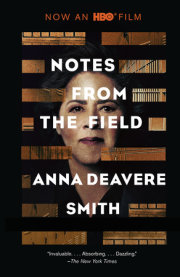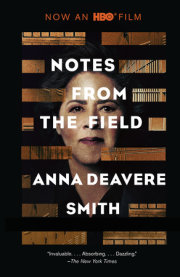[Slide]
SHERRILYN IFILL
President and Director-Counsel
NAACP Legal Defense and Educational Fund
From an Onstage Conversation between Ms. Ifill and Ms. Smith
Baltimore, Maryland, June 3, 2015
“Big Bets”
(Ms. Ifill is a public figure. Really good with a crowd, could run for office. African American, late forties. Brightly colored jacket, simple slacks. Footage is available to study her speech patterns, some of which are indicated within the text via punctuation. In a theater in Baltimore, standing room only, a crowd that is really revved up, not that long after the Baltimore riots in 2015. Onstage being interviewed by the author. Handheld mic in her hand, easy chairs, table, flowers, water.) I get asked this question all the time: what—how would you, what is the number one civil rights issue of the day. And . . . and I’m very uncomfortable with that question. Because . . . it is impossible to talk about the criminal justice system. Mass incarceration. Without talking about education. Because this country is always engaged in investments. Big investments, we make big bets. Nineteen-fifties, you know, this country massively invested in the creation of the suburbs, right? We created the interstate highway system. We provided, you know, tax credits to developers to build suburbs—that were racially exclusionary, by the way. But we made an investment! We decided—we—we made a massive investment in creating a middle class, really beginning in the 1930s, when the federal government started to insure mortgages, and only insured mortgages for—for white people, but we made an investment.
Now today, we pretend we don’t make investments. ’Cause we talk about balancing the budget, and deficits. And we don’t have any money, and we don’t make—but we always make investments. And one of the huge investments that we made was in the criminal justice system. And that investment was made at the expense of other investments. We have taken dollars that we used to give, and that we could give, to invest in the issue of mental illness. It’s not that we’re not investing in mental illness. We are. We’re investing it in the prison system. It’s not that we’re, you know, talking—we—we decided we’re going to cut the budget and so we’re not investing in education. Yeah. Kinda. We’ve taken it to the prison system.
So what we do is we take these investments that we could make, these big bets, and we place them somewhere. And that’s what we call policy. Which, you know, makes people’s eyes glaze over, but we should understand; policy is made up of the investments that we as a society decide to make.
The moment that we’re in, by the way. Not only, you know, [here] in Baltimore. [I] spent time in St. Louis County, with Ferguson over the last year, and our lawyers were down North Charleston, in South Carolina. Where Walter Scott was killed, and the man we saw on the video. Being shot.
There’s a lot of heaviness in this country in this moment. There’s a lot of pain. And, you know, I always say, “America is an interesting place.” It’s like one of my favorite movies, The Matrix. Where, you know, every once and a while, you eat the red pill? Whatever is the pill that makes you see the matrix. But you know, we can’t sustain it. Because it’s awful! You know, when you see all the strings, and you see everything that’s behind the scenes. We do have to enjoy ourselves. And live, and . . . make a way, you know, out of no way. But sometimes, you—you have to have these moments if we are going to move our society forward. It takes moments, kind of—almost epic moments. To move us, to be able to take the red pill. So there’s a way in which we are confronting this moment. And there is a privilege in that confrontation.
Copyright © 2019 by Pearl B. Young, Inc.. All rights reserved. No part of this excerpt may be reproduced or reprinted without permission in writing from the publisher.










